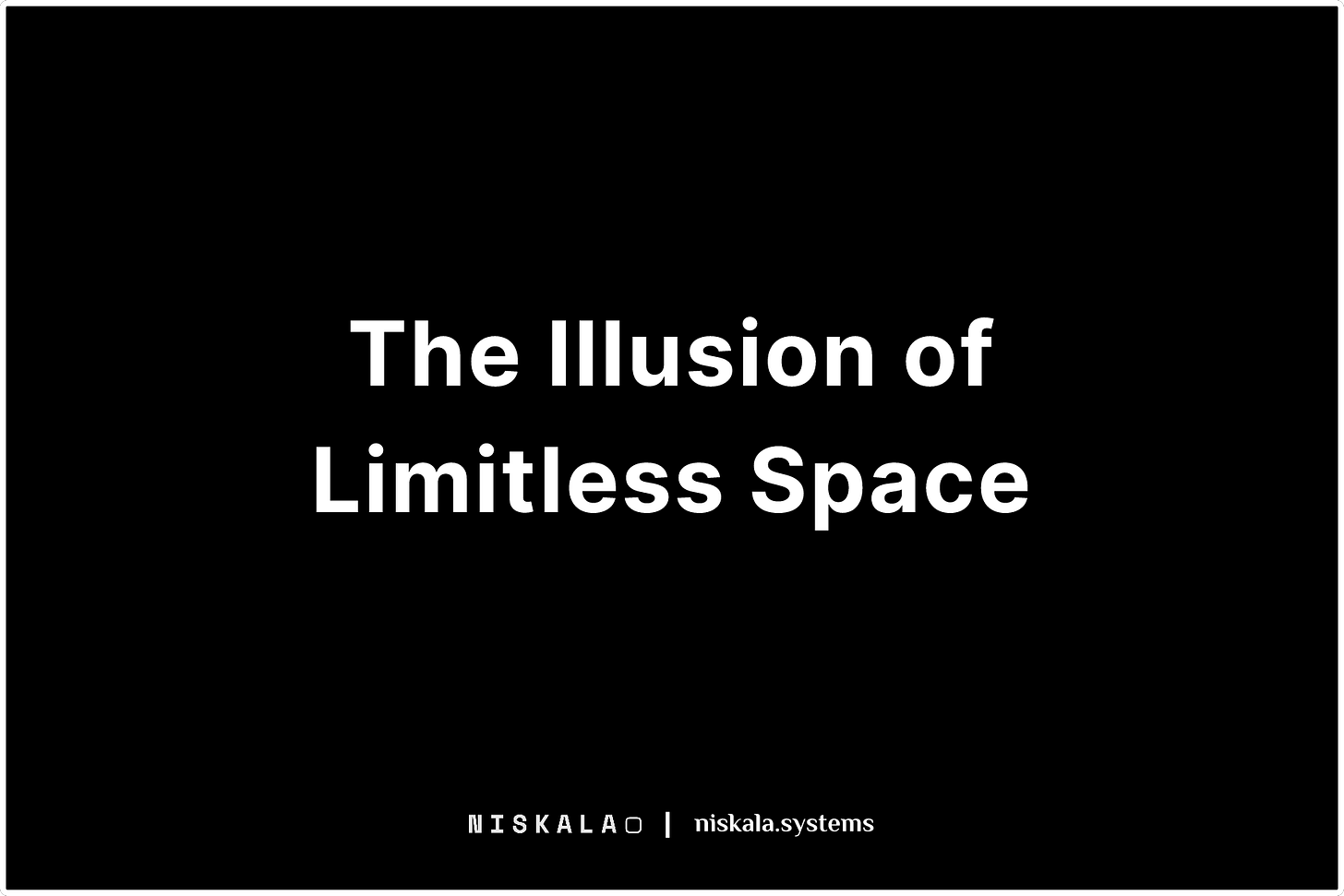Freedom is Just Another Cage With More Space
Walking through walls that aren't there
The Geometry of Containment
You’re standing in a meadow that stretches to the horizon. No fences. No “No Trespassing” signs. The air smells like possibility. But your feet won’t move past an invisible line. Not because something stops you — because everything does.
Modern freedom operates like this: the more space you’re given, the heavier the responsibility of choosing becomes. Each open field contains hidden tripwires of social expectation, algorithmic suggestion, and the crushing weight of infinite alternatives. We’ve swapped padlocks for paralysis.
Consider your phone’s app store. Two million “choices.” Yet you’ll download the same five apps everyone else does. The freedom to choose becomes the obligation to conform — not because anyone forces you, but because the architecture of options guides your hand. You’re a fish swimming in an ocean that’s been secretly shaped like a river.
The first skill: map the water. Notice where your decisions flow effortlessly versus where they eddy. The paths worn smooth by a million footsteps before yours aren’t accidents. They’re engineered.
The Myth of the Blank Canvas
“You can be anything!” they said. So why does that feel like a threat? Blankness terrifies. Unlimited potential becomes a hall of mirrors — endless reflections of paths not taken.
We invent constraints to cope. The hipster who only drinks single-origin coffee. The entrepreneur obsessed with “niching down.” The suburban dad with 37 identical navy polos. These aren’t personalities — they’re panic responses to the void of absolute choice.
Watch any toddler in a toy store. Overwhelmed by options, they either freeze or grab the nearest bright object. Adults do the same with life paths, partners, and political ideologies. Our curated identities are often just the first shiny thing we grabbed before the anxiety set in.
Second skill: interrogate your comforts. That thing you “chose freely”? Trace its origins. Odds are, it chose you through cultural osmosis, targeted ads, or the quiet desperation to belong. Freedom’s cage often comes lined with velvet.
The Bureaucracy of Liberation
True story: In 2023, a European country introduced a law requiring employers to ignore after-hours emails. Workers gained freedom from constant connectivity. Within months, productivity dropped. Anxiety spiked. The unshackled time felt like stolen time — an empty expanse they didn’t know how to fill.
This is freedom’s dirty secret: structure sets us free. Complete autonomy collapses into chaos. We need walls to push against, rules to break (or follow). The most effective cages are those we beg for — the unspoken agreements that make society function.
Your third skill: build better walls. Instead of resenting constraints, design your own. Curate your options. Set artificial boundaries. The rebel isn’t who ignores all rules — it’s who chooses which rules to follow with eyes wide open.
The Algorithm of You
Netflix knows your taste better than your mother. Spotify’s “Discover Weekly” feels psychic. This isn’t magic — it’s the panopticon perfected. Every “like,” pause, or skip trains your personal cage’s bars to better match your contours.
We call this customization. It’s actually soft coercion. By reflecting our preferences back to us, algorithms create frictionless ruts. The world bends to our biases until we forget other worlds exist. Your freedom to choose becomes the freedom to choose more of what you’ve already chosen.
Fourth skill: cultivate strategic randomness. Follow a stranger’s playlist. Click the seventh search result instead of the first. Let spontaneity be your jailbreak tool. The goal isn’t to escape the cage — it’s to keep it from shrinking.
The Freedom Tax
Every choice costs something. Brainpower. Time. The psychic weight of road-not-taken regret. This is why wealthy people wear uniforms. Why CEOs delegate dinner choices. Freedom has overhead, and we’re all bankrupting ourselves paying it.
The modern world sells liberation as empowerment. But at 3 AM, scrolling through 82 identical toothpaste options, empowerment feels suspiciously like servitude. We’ve outsourced tyranny to the marketplace, trading kings for product managers.
Fifth skill: declare personal sovereignty. Make non-choices. Let certain decisions default. Your time and attention are currencies — stop spending them on trivial liberations. Sometimes, the most radical freedom is letting someone else pick the restaurant.
Breathing Room as Battlefield
Here’s the truth they won’t tell you: complete freedom is unbearable.
We need constraints like lungs need air — the pressure difference that makes breathing possible. The art lies in choosing what constrains you.
Your final skill: become an architect of necessary walls. Build gardens with deliberate fences. Let certain values be non-negotiable. Ban options that drain more than they give. True freedom isn’t the absence of barriers — it’s the presence of meaningful barriers.
The cage never disappears. But with practice, you’ll learn to shape its walls into something resembling home.



